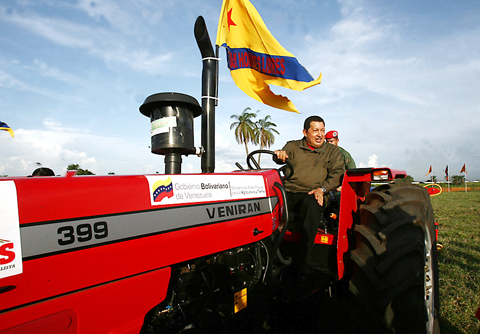Venezuela’s government may take temporary control of a shuttered medicine plant that belongs to Pfizer Inc, a top official said on Friday, suggesting that the New York-based company should resume production.
Venezuela’s consumer protection agency planned to ask Venezuelan President Hugo Chavez to order the takeover after Pfizer closed a medicine factory in the eastern city of Valencia, one of two it has in Venezuela, said Venezuelan Trade Minister Eduardo Saman, who heads the agency.
“We’re very worried, because this plant makes essential medicines that are needed in the country,” the state-run Bolivarian News Agency quoted Saman as saying.

PHOTO: AP
It wasn’t clear when the plant was closed or for what reason and calls seeking comment from Pfizer Venezuela SA in Caracas went unanswered.
A statement from Pfizer in New York said the company “will continue to provide important medicines across a range of key therapeutic areas,” and noted that it is “committed to engaging in an ongoing dialogue with the Venezuelan authorities.”
Local Pfizer workers met with Saman on Thursday and asked the government to take over the factory in order to protect their jobs.
The pharmaceutical giant had received permission from the government to buy a significant amount of dollars to import medicines — an increasingly rare privilege as falling oil prices force Venezuela to restrict access to scarce dollars.
Under currency controls imposed in 2003, Venezuelan companies and individuals need government approval to buy dollars at an officially set exchange rate.
Venezuela’s government this year took control of food-processing plants that allegedly failed to produce pasta and rice at government-set prices, including one rice-processing plant owned by Minnesota-based food giant Cargill.
Chavez on Thursday announced plans to nationalize at least six metal, ceramic and other companies as his government seeks to build an “industrial complex” that he says will help push Venezuela toward his vision of socialism.

PROTECTION: The investigation, which takes aim at exporters such as Canada, Germany and Brazil, came days after Trump unveiled tariff hikes on steel and aluminum products US President Donald Trump on Saturday ordered a probe into potential tariffs on lumber imports — a move threatening to stoke trade tensions — while also pushing for a domestic supply boost. Trump signed an executive order instructing US Secretary of Commerce Howard Lutnick to begin an investigation “to determine the effects on the national security of imports of timber, lumber and their derivative products.” The study might result in new tariffs being imposed, which would pile on top of existing levies. The investigation takes aim at exporters like Canada, Germany and Brazil, with White House officials earlier accusing these economies of

EARLY TALKS: Measures under consideration include convincing allies to match US curbs, further restricting exports of AI chips or GPUs, and blocking Chinese investments US President Donald Trump’s administration is sketching out tougher versions of US semiconductor curbs and pressuring key allies to escalate their restrictions on China’s chip industry, an early indication the new US president plans to expand efforts that began under former US president Joe Biden to limit Beijing’s technological prowess. Trump officials recently met with their Japanese and Dutch counterparts about restricting Tokyo Electron Ltd and ASML Holding NV engineers from maintaining semiconductor gear in China, people familiar with the matter said. The aim, which was also a priority for Biden, is to see key allies match China curbs the US

Teleperformance SE, the largest call-center operator in the world, is rolling out an artificial intelligence (AI) system that softens English-speaking Indian workers’ accents in real time in a move the company claims would make them more understandable. The technology, called accent translation, coupled with background noise cancelation, is being deployed in call centers in India, where workers provide customer support to some of Teleperformance’s international clients. The company provides outsourced customer support and content moderation to global companies including Apple Inc, ByteDance Ltd’s (字節跳動) TikTok and Samsung Electronics Co Ltd. “When you have an Indian agent on the line, sometimes it’s hard

‘SACRED MOUNTAIN’: The chipmaker can form joint ventures abroad, except in China, but like other firms, it needs government approval for large investments Taiwan Semiconductor Manufacturing Co (TSMC, 台積電) needs government permission for any overseas joint ventures (JVs), but there are no restrictions on making the most advanced chips overseas other than for China, Minister of Economic Affairs J.W. Kuo (郭智輝) said yesterday. US media have said that TSMC, the world’s largest contract chipmaker and a major supplier to companies such as Apple Inc and Nvidia Corp, has been in talks for a stake in Intel Corp. Neither company has confirmed the talks, but US President Donald Trump has accused Taiwan of taking away the US’ semiconductor business and said he wants the industry back